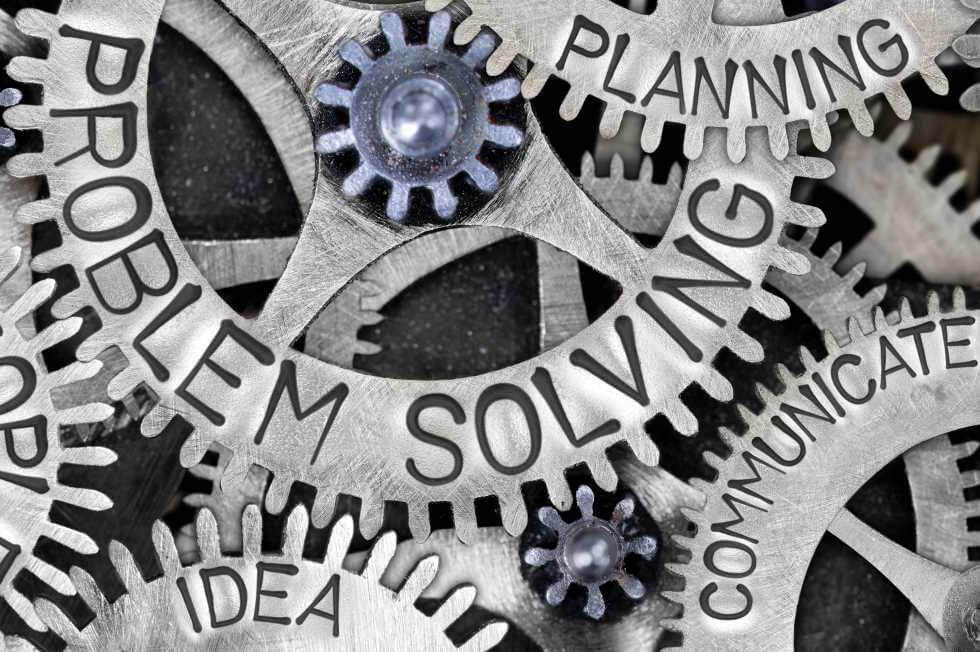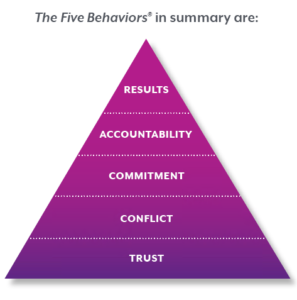The productivity challenge in the UK remains, the search for high performance continues and the post Covid work life balance dynamic is here to stay.
In this context, as business leaders, we need a model more than ever to help deliver the results we are seeking for our people, our teams and our organisations.
One model that we apply in our own business, which has seen great results, is the Five Behaviors developed by Patrick Lencioni. In fact, I liked it so much I became accredited to train organisations in its application.
The process kicks off by assessing the level of each of the Five Behaviors in the team by asking each team member to answer an online questionnaire. This sets a base line and we retest after the workshop to measure the improvements made. The workshop will build on this knowledge by focussing on the areas where the team needs to demonstrate different behaviours and takes each team on a journey to better results. The ultimate goal for any team is the achievement of results and this is realised by building greater trust, healthy conflict, commitment and accountability.
Trust One Another
When team members are genuinely transparent and honest with one another, they are able to build vulnerability based trust. People become much less defensive, admit their mistakes, reach out for help when they need it and readily appreciate the questions and comments of peers.
Engage in Conflict around Ideas
When there is trust, team members are able to engage in unfiltered, constructive debate of ideas, which leads to more options being considered and more robust solutions being developed. It may be that the person raising issues and asking questions is the most valuable in the room rather than the most awkward.
Commit to Decisions
When team members are able to offer opinions, debate ideas and feel they have been listened to, they will be more likely to commit to the decisions made by the team. This is real commitment to rather than passive acceptance of the way forward.
Hold One Another Accountable
When everyone is committed to a clear plan of action, they will be more willing to hold one another accountable and to be held accountable for their own actions.
Focus on Achieving Collective Results
When the above behaviours are demonstrated by the team consistently then improved results are delivered.
My experience of working with teams is that the leaders will start with a focus on results and often blame a lack of accountability amongst team members when targets are missed. The key is to go beyond this and understand the root cause of the issue, by working back through each of the behaviours to understand which is lacking. Without this process, any trust, which may already be weak, can be undermined further. Threatening severe consequences for underperformance when an individual did not feel heard and did not buy into the decision will only be detrimental to trust and de-motivating. It may lead to finger pointing, distraction tactics and attempts to pass the blame. How often have you sat in team meetings and experienced this or worse, destructive conflict where the purpose seems only to be to find a culprit to blame?
What is needed is a recognition that things are not working and for team members to acknowledge their part in this. Without that nothing changes, and we risk a cycle of repeated failures, employee turnover, further failed attempts and lack of progress. It is not hard to see how productivity remains stubbornly low and change is limited in these circumstances.
Building trust is the foundation of the model and, at a deeper level, allows the individuals to be at their most vulnerable, safe in the knowledge that they will not be attacked nor taken advantage of. It takes times to build this level of trust but the investment of time and energy will be repaid many times over. It is this trust that leads to constructive conflict and allows teams to embrace robust and rigorous debate. Where did this go wrong? What can I do differently next time? How can I help you? What help do I need?
In an environment where recruitment remains challenging, economic headwinds are stronger and customers ever more demanding, high performing teams are key. We owe it to our people, our businesses and ourselves to get this right. It starts with an honest assessment of where you believe the level of trust is in your teams. It finishes with the results you need.
Contact Will Abbott for more information by emailing will.abbott@randall-payne.co.uk or call 01242 776000.




